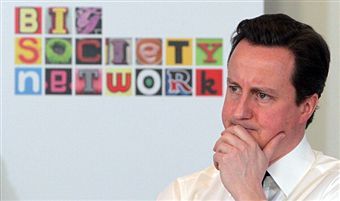 I was invited to Somerset House on the Strand yesterday as part of the Big Society
Network to watch David Cameron take questions for the best part of an hour on his pet subject. My organisation, New Deal of the Mind, has been helping deliver two welfare-to-work contracts since
last year and, along with most people in what I have learned to call “the third sector” I am prepared to give this idea the benefit of the doubt. There doesn’t seem to be anything
particularly ideological about the Big Society, although Ed Miliband showed in his Independent on Sunday article at the weekend just how convenient a
whipping boy this has become for Labour
I was invited to Somerset House on the Strand yesterday as part of the Big Society
Network to watch David Cameron take questions for the best part of an hour on his pet subject. My organisation, New Deal of the Mind, has been helping deliver two welfare-to-work contracts since
last year and, along with most people in what I have learned to call “the third sector” I am prepared to give this idea the benefit of the doubt. There doesn’t seem to be anything
particularly ideological about the Big Society, although Ed Miliband showed in his Independent on Sunday article at the weekend just how convenient a
whipping boy this has become for Labour
You can’t blame Ed Miliband for his cynicism. The architects of the Big Society within government have not communicated their ideas well and David Cameron should certainly stop using examples from his Oxfordshire constituency to illustrate a concept that will only succeed if it transforms lives north of Witney. However, others in the Labour Party (Jon Cruddas and David Lammy, for instance) recognise that the left will soon have to develop its own version of the Big Society.
It seems the more words that are expended on explaining the Big Society, the more mystified the public becomes. Over the weekend, the Prime Minister made a valiant effort in the pages of The Observer.
Phillip Blond over at the ResPublica has made it his mission to evangelise on this subject and has been prepared to go where Conservative ministers fear to tread. He squared up against Tessa Jowell last week and he has been all over the airwaves again over the past 24 hours.
However, to my mind, the issue for The Big Society was summed up best, not in an article, but in a tweet from Phillip’s colleague at ResPublica Indy Johar. On Sunday he said this: “Insufficiently discussed – But #BigSociety equally needs to be about rolling back the corporates as the centralised state.” I couldn’t agree more. The reality is that there is a real risk the Big Society will become colonised by large private sector service companies such as Serco, G4S and A4E who stand to make a lot of money from government. Nothing wrong with this, in principle, if they deliver the services more cheaply and effectively. Voluntary organisations and social enterprises across the country are already preparing themselves for the new world where they will have to establish partnerships with these giant organisations in order to survive.
Yesterday I asked David Cameron what he is doing to stop the Big Society being strangled at birth by corporate interests. He told me he understood the problem. I look forward to hearing how he plans to unpick this fundamental conundrum.






Comments